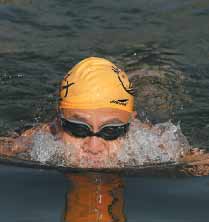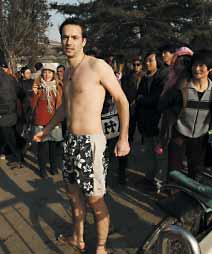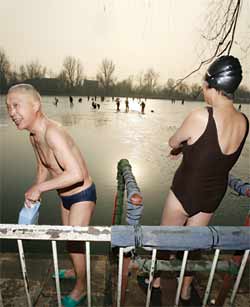Beijing"s winter is cold in the eye-watering, cheek-tightening, nose-running sense of the word. And yet, every year dozens of barmy Beijingers brave the big freeze to strip off and swim in the icy waters of the city"s lakes and outdoor pools.

It is estimated that about 10,000 Beijingers swim outdoors every winter, and most of them are elderly. |
Seventy-year-old Guo Futang, who has 35 years of winter swimming experience, goes to the outdoor swimming pool at Tsinghua University at 10:30 am nearly every morning. He locks his bicycle next to the pool, takes off his clothes, except for his swimming trunks and starts warming up. Guo said he feels uncomfortable if he misses his daily swim, and even takes cold-water showers at home if he can"t get out for a dip.
"It is cold, but once you are used to the water temperature, your body begins to warm up. Your bones and joints are extended and you get a great feeling of relaxation," he said.
Guo is typical of China"s winter swimmers: fervently devoted, and a firm believer in the health benefits of jumping into icy water.
Swimming during the winter is a tradition for many elderly Beijingers who head to places like Tsinghua University, Yuyuantan Park and Shichahai Lake to take a dip. 
Li Lin, director of the Beijing Winter Swimmers Association, said there are more than 300,000 winter swimming fans in China, 3,200 of them are registered with his association.
There are thousands more who have not registered. It is estimated that about 10,000 Beijingers swim outdoors every winter, and most of them are elderly. The oldest known Beijing winter swimmer is 89 years old and the youngest 11.
Li himself has over 20 years winter swimming experience. "It"s definitely good for people"s health. It improves circulation and can aid certain ailments. But you have to be careful if you have a cardiovascular condition," said the 43-year-old.
 Those who spend years of swimming in near freezing water enjoy more than just physical benefits. "It puts us in good spirits. Everything in life becomes less difficult, as nothing"s as hard as winter swimming," Li said.
Those who spend years of swimming in near freezing water enjoy more than just physical benefits. "It puts us in good spirits. Everything in life becomes less difficult, as nothing"s as hard as winter swimming," Li said.
Although there is a large number of winter swimmers, there are relatively few places where they can enjoy an outdoor dip. A few years back the city government passed a law prohibiting outdoor swimming in "non-swimming areas." These areas include nearly every park where Beijingers do their swimming, including Houhai.
In response to the new laws, the Beijing Winter Swim Club has called on the municipality to provide a few designated spots for legal winter swimming. The club hopes that such designated spots might have better facilities, such as changing rooms, and hopefully cleaner water. The authorities have yet to respond, but in the meantime swimmers are still flocking to the lakes such as Houhai, Yuyuantan, and Kunming Lake.
On January 6, the 28th Beijing Winter Swimming Performance Contest was held in Yanqing County. There are only two or three dates a year when Beijing"s winter swimming groups can legally swim in public lakes.
China has no laws or regulations to standardize winter swimming. In some areas, local policies restrict swimming in public bodies of water out of consideration for the environment.
Zhang Jian, director of the Outdoor Sports Center of Beijing Sports University, is in charge of promoting outdoor water sports in the capital. According to Zhang, who once swam across the English Channel, men"s and women"s 10-kilometer open water swimming will be added to the Beijing 2008 Olympic Games as a formal event. This will play a decisive role in promoting winter swimming.
(China Daily 01/18/2007 page4)
 11010802026271
11010802026271